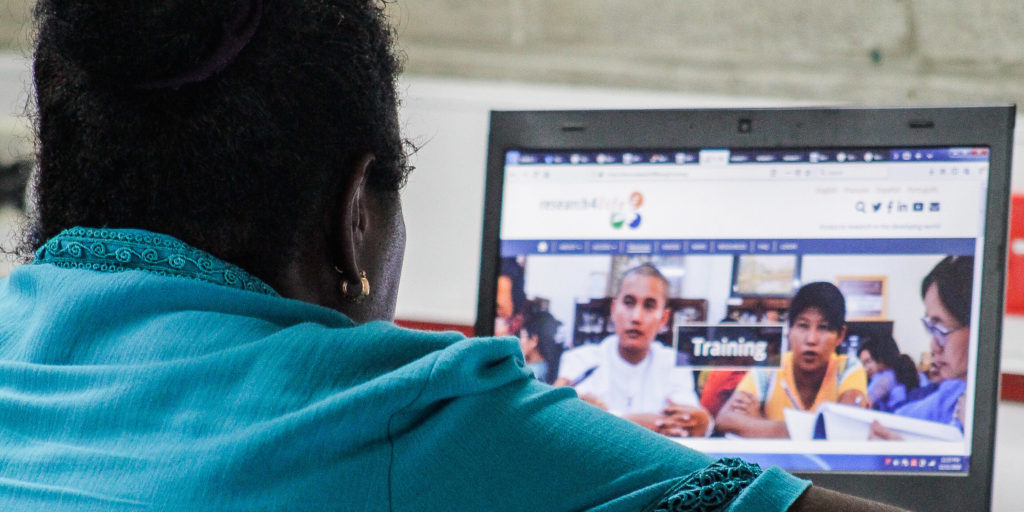Register now for the 2020 Research4Life online course
Research4Life users can now register for the second edition of the Research4Life Massive Open Online Course (MOOC). The free course, which is taught in English, will run from 20 April to 24 May 2020 and will help users to get the most out of the available resources through the Research4Life programs (Hinari, AGORA, OARE, ARDI and GOALI). Hear from users who took part in the first edition of the MOOC.

Research4Life is a knowledge platform that provides access to up to 100,000 leading journals, books and other resources in the fields of health, agriculture, environment, innovation and law. More than 10,000 institutions in more than 120 low- and middle-income countries are benefiting from Research4Life.
The deadline for applications is 7 April. Successful participants will be informed by 9 April 2020.
Who should apply?
Users of Research4Life are welcome to take part in the course. Not sure if you have access to Research4Life? Check with your institution’s librarian. If you institution does not have access to Research4Life, review our eligibility criteria to see if you qualify for access.
The course was developed for librarians, information professionals, IT specialists, researchers, academics, lecturers, educators, students including graduates and postgraduates, and professionals, such as doctors, policymakers, extensionists, lawyers, social workers and statisticians in countries and institutions that are eligible to subscribe to Research4Life.
Participants are expected to spend on average six to eight hours per week on lessons and activities, such as contributing to discussion forums and webinars.
What do you get from this course?
The Research4Life MOOC follows a modular structure, which allows participants to study their area of interest throughout a five-week period. The course covers topics relevant across all Research4Life programs, such as the scholarly communication landscape, information literacy skills, advocacy and capacity development strategies. Additionally, it provides discipline-specific information for Hinari, AGORA, OARE, ARDI and GOALI.
Participants will be provided with a Certificate of Attendance after completing the exam at the end of the course. Those who pass the exam with a grade of at least 70.00 will receive a Certificate of Achievement.How to apply?
For further information, please contact us at [email protected].
What is included in the course?
Module 1: Scholarly communication and Research4Life: this module provides an overview on scholarly communication, the publishing landscape, key concepts about Research4Life including details about the partnership, programmes’ coverage, eligibility criteria, and registration. Lessons included in this module are:
- Lesson 1.1: Scientific landscape
- Lesson 1.2: Research assessment and bibliometrics
- Lesson 1.3: Research4Life
Module 2: Discovery and re-use of scholarly literature: this module covers key concepts of information literacy skills and competencies, including academic ethics, licensing and academic collaboration tools. Lessons included in this module are:
- Lesson 2.1: Identifying information sources
- Lesson 2.2: Using information resources
- Lesson 2.3: Intellectual property and copyright – Ethics and plagiarism
- Lesson 2.4: Citing, reference management and collaboration tools
Module 3: Discipline-specific browsing and searching: this module describes the five Research4Life programmes (Hinari, AGORA, OARE, ARDI, GOALI) in detail, including how to conduct discipline-specific search, an introduction to Summon to search across programs and the bibliometric analysis tools: Scopus and Dimensions, which are provided within Research4Life. Lessons included in this module are:
- Lesson 3.1: Hinari: Research in Health
- Lesson 3.2: AGORA: Research in agriculture
- Lesson 3.3: OARE: Research in the Environment
- Lesson 3.4: ARDI: Research for Development and Innovation
- Lesson 3.5: GOALI: Research for Global Justice
- Lesson 3.6: Search across Research4Life programmes
- Lesson 3.7: Citation databases
Module 4: Additional discipline-specific resources: This module focuses on additional discipline-specific resources and services in the five main disciplines of the Research4Life programmes. Lessons included in this module are:
- Lesson 4.1: Health
- Lesson 4.2: Agriculture, forestry, fisheries, climate, food security, related biological and environmental sciences
- Lesson 4.3: Environment
- Lesson 4.4. Development and innovation
- Lesson 4.5. Global justice
- Lesson 4.6. Interdisciplinary resources
Module 5: Advocate on Research4Life and Facilitate Capacity Development: this module teaches you how to design advocacy strategies to address decision makers and upper management. It also guides you on how to train local groups on how to use Research4Life. Lessons included in this module are:
- Lesson 5.1: Research4Life Advocacy Toolkit
- Lesson 5.2: Training Your Audience on How to Use Research4Life





